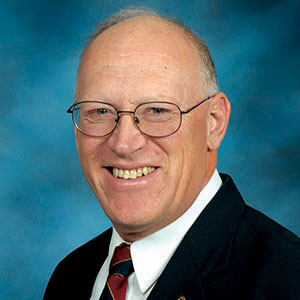Kansas Profile – Now That’s Rural: KJ Wall, rural attorney shortage
At a glance: Native Kansan and Kansas Supreme Court Justice KJ Wall was asked to chair the court’s Rural Justice Initiative, aimed at remedying a looming lack of attorneys in rural Kansas. After months of interviews and other research, the committee will make its report in fall 2024.
More information: Ron Wilson, rwilson@ksu.edu, 785-532-7690
Photos: Ron Wilson | KJ Wall
Website: Huck Boyd National Institute for Rural Development
May 29, 2024

By Ron Wilson, director of the Huck Boyd National Institute for Rural Development at Kansas State University
Kansas Supreme Court Justice KJ Wall walks into a room, but this isn’t the Supreme Court Chambers. It’s not even a courtroom. This room is at a high school in Ashland, Kansas.
![]() A group of high-schoolers had an opportunity to meet a Supreme Court Justice through the Kansas Supreme Court Traveling Docket program. Now, the court has launched another initiative to help more attorneys serve rural Kansas.
A group of high-schoolers had an opportunity to meet a Supreme Court Justice through the Kansas Supreme Court Traveling Docket program. Now, the court has launched another initiative to help more attorneys serve rural Kansas.
At right: KJ Wall | Download this photo
Wall, a Scott City native, graduated from K-State and then went to KU law school. He had a distinguished law career before being appointed to the bench in 2020.
The Supreme Court began observing a disturbing trend in the legal system: Rural areas were becoming underserved. For example, 80% of Kansas attorneys are located in the state’s six most populous counties.
“Our chief judges were telling us they didn’t have enough attorneys to make appointments, and we have successful older attorneys who weren’t finding folks to take over their practice,” Wall said.
In December 2022, Chief Justice Marla Luckert issued an order establishing a Rural Justice Initiative Committee to be chaired by Justice Wall. That committee includes rural judges and attorneys; legislators; and representatives of agriculture, business and nonprofit organizations plus the Office of Rural Prosperity and Washburn and KU law schools.
The committee is staffed by Laurel Searles, Chief of Attorney Services and Compliance in the Office of Judicial Administration at the Kansas Supreme Court.
The committee is to study the issue, gather data, and make recommendations by fall 2024. Statewide surveys and listening sessions have been conducted along with interviews of law school students.
“(The shortage of attorneys) is becoming a constitutional crisis,” Wall said. “People have a right to representation.”
Searles adds: “People in rural Kansas deserve access to attorneys just like people in the cities.
And, “as more attorneys retire, it is getting more difficult for people to be served,” said committee member and attorney Ashley Comeau of Plainville.
Comeau is a young professional who graduated from Washburn Law School. She and her husband moved back to their home area in northwest Kansas where she joined a Hays law firm and maintains a practice in Plainville.
“We would like to replicate people like Ashley, who worked with a large law firm in Kansas City but chose to come back to her home area,” Wall said. “I thought we just needed to attract more attorneys to non-urban locations, but the law schools are telling us they don’t have enough people applying in the first place.”
That means more young people need to be encouraged earlier to consider a career in law.
“We need to start these conversations earlier in a student’s career,” Searles said. “There are lots of opportunities to work in the legal field. We’re now seeing law firms participate in high school career fairs.”
Student debt is a huge issue. “We need to be more flexible and open when considering incentives to bring students to rural Kansas,” Comeau said.
“We also need to help students feel that they belong in those communities,” Searles said.
So why practice in rural Kansas? “You develop closer relationships and can do a lot more hands-on work,” Comeau said.
“This type of work really makes a difference and gives you more purpose,” Searles said.
Wall agreed. In some cases, he believes the financial returns of a rural practice could even exceed that of an urban practice in the long run.
In 2011, the Kansas Supreme Court began conducting a traveling docket where cases are heard in communities around the state. While there, the justices also visit local schools and inform students about legal careers. That’s how Justice KJ Wall came to meet the high school students in the rural community of Ashland, population 783 people. Now, that’s rural.
We commend Justice KJ Wall and all of the Kansas Supreme Court, plus Laurel Searles, Ashley Comeau and others involved in this initiative. I hope it helps move more students from the high school classroom to the hometown courtroom.
Audio and text files of Kansas Profiles are available at http://www.kansasprofile.com. For more information about the Huck Boyd Institute, interested persons can visit http://www.huckboydinstitute.org.
***

K‑State Research and Extension is a short name for the Kansas State University Agricultural Experiment Station and Cooperative Extension Service, a program designed to generate and distribute useful knowledge for the well‑being of Kansans. Supported by county, state, federal and private funds, the program has county extension offices, experiment fields, area extension offices and regional research centers statewide. Its headquarters is on the K‑State campus in Manhattan. For more information, visit www.ksre.ksu.edu. K-State Research and Extension is an equal opportunity provider and employer.